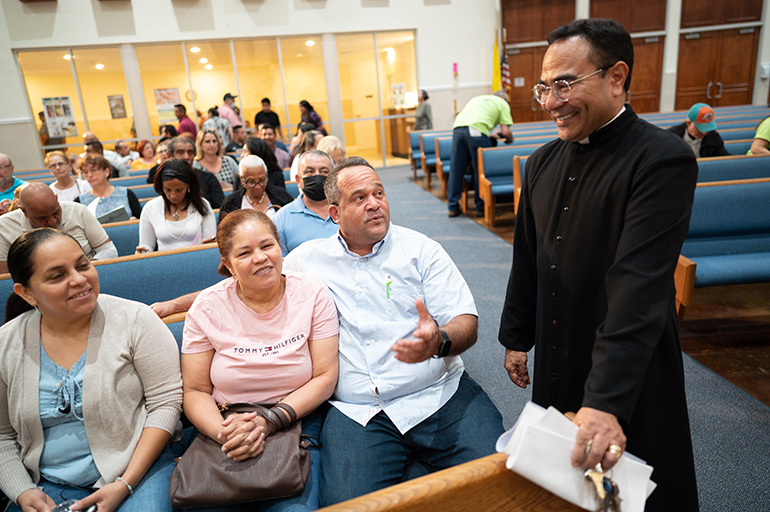By Tom Tracy, Florida Catholic
POMPANO BEACH | Over 14,000 people in Broward County were arrested for misdemeanor offenses in one year alone. Community organizers maintain that many could have been sent to a pre-arrest diversion program but instead were branded for life with a criminal record.
Broward County Sheriff Gregory Tony responded to those concerns while meeting March 30, 2023, at San Isidro Church with hundreds of BOLD Justice (Broward Organized Leaders Doing Justice) members, including many from several Catholic parishes in Broward.
They pointed out that in the last 12 months, only 62 people were placed in Broward’s pre-arrest diversion program — far below the percentage of similar juvenile civil citation cases processed annually in Miami-Dade and Pinellas Counties, for example.
Florida’s Civil Citation program — through Florida Statute 985 – can divert juveniles from an arrest record toward a community-based diversion program by offering first-time misdemeanors in the case of non-serious offenses.
The program allows juveniles to make restitution to victims and complete interventions to change their behavior without obtaining a criminal record, which can lead to people losing their jobs, having difficulty finding new employment or housing, and for some can lead to deportation.
Experts say many of the arrests are for driving offenses such as driving without a license, driving on a suspended license and driving with an expired tag.
Sheriff Tony told the gathering that he is himself a product of the African American community and that he is sensitive to state statistics that show how deeply such arrest records have impacted minority communities in South Florida.
The sheriff also promised that his department is taking steps to better use alternatives to criminal arrests where appropriate. He noted that Broward detention facilities, with some of the highest incarceration rates in Florida, are costing taxpayers, and that he is sympathetic to the need for reform.
“We are spending $300 million to keep (inmates) in, but how much are we spending to keep them out?” said the sheriff, who began his law enforcement career in 2005 with the Coral Springs Police Department. He served on the SWAT team and rose to the rank of sergeant. He also worked in narcotics investigation, burglary apprehension, street intelligence and field force. He also received numerous awards, commendations and honors.
Father Wilfredo Contreras, pastor of San Isidro Church and host of the March 30 gathering, spoke about specific cases where civil citations may have benefited individuals in the community.
The priest said he was sensitive to some public concerns that such programs might be equated with the kind of high-profile street crime or increased rates of looting associated with certain communities around the country.
“A record for life ruins many people’s opportunities for jobs, service in the military, and even to attend college,” Father Contreras told The Florida Catholic. “Many of our folks in Broward County are getting arrested for misdemeanors such as loitering, littering, disorderly conduct, trespassing and the more common one which is driving offenses. This needs to stop.”
To illustrate the point further, a San Isidro parish secretary, Esperanza Puerta, a native of Venezuela, told the gathering how an arrest for a driving offense she accrued in 2010 threatened her legal standing in the U.S. and created layers of difficulty and unintended consequences.
“It took almost a year to get my driver’s license back because the appointments are so delayed,” said Puerta, who arrived in the U.S. in 2004. “Now I am able to work and drive here, and have Temporary Protected Status.”
Also on hand at the BOLD meeting was Peter Routsis-Arroyo, CEO of Catholic Charities of the Archdiocese of Miami, who credited the group for highlighting issues facing real people, which politicians and local officials need to address.
“One of the other goals is about global warming and the fact that the county has a budget for developers paying into a fund for the replanting of trees in the county in tandem with development, and that is an issue for everybody,” Routsis-Arroyo said.
Arrest records are also an issue that impacts everybody.
“People can get pulled over and it doesn’t have to be a level that creates all sorts of problems and challenges for people going forward in terms of fines, a whole chain of reactions afterwards,” he added.
See original story here.






